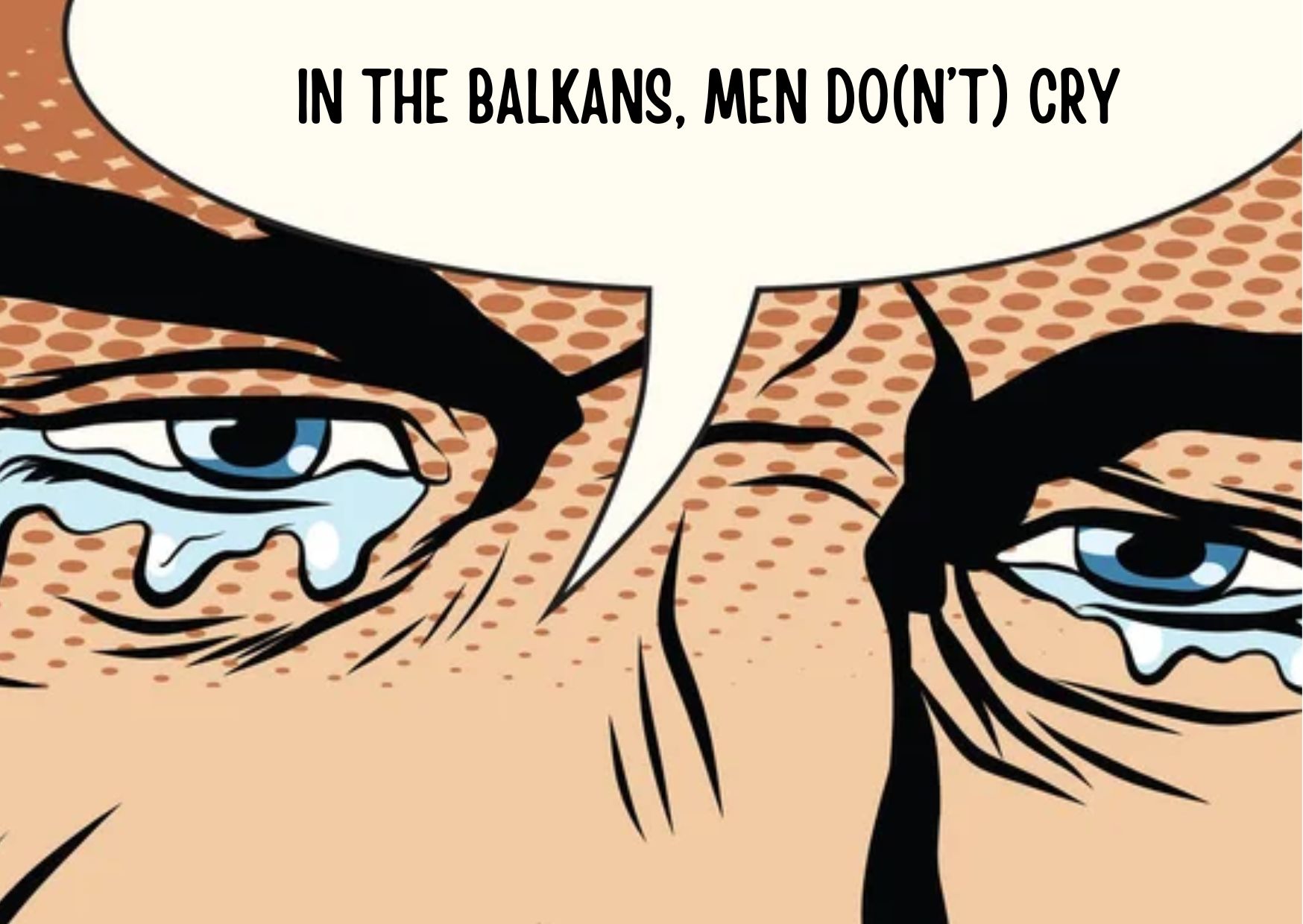Young people's awareness of environmental problems in the Western Balkans is undoubtedly growing, but awareness alone is not enough. Insufficient knowledge of environmental problems leads to failed environmental protests. Due to the lack of results, the motivation for action decreases, so does the faith of young people that their voice is being heard.
-1661346231.jpg)
Photo credit: Jovana Stanković; Description: Protests against air pollution in January 2021. in Belgrade
Another Friday, another day for young people around the world to gather to fight for our planet. Instead of finishing homework, putting books in their backpacks and rushing to school or college so as not to be late for class, on Fridays, they put on their old shoes, bring their banners with important ecological issues and head to City Hall, to Government building, and to National Assembly. For them, those places are not just buildings, but places in front of whose gates they proudly raise their posters, flags, banners and their voices on behalf of all their peers, those to whom the planet remains in trust.
The voice of young environmental activists can be heard far away and is already echoing in the ears of decision-makers around the world. Greta Thunberg from Sweden, Timothy Naulusala from Fiji and Remy Zahiga from the Democratic Republic of the Congo are just some of the young climate activists who have managed to make changes, not only in their communities, but also around the world.
The urge to fight against the climate change affects most of the world, but there is one part of Europe that is among the most polluted parts of the old continent. A region where 16 thermal power plants are working full steam, and a region where coal mines are becoming more numerous over time. There are no clear policies in the region to combat climate change, and young people don’t have the enthusiasm to initiate environmental actions and protests like their peers from other parts of Europe and the world do. That region is the Western Balkans.
Bosnia and Herzegovina, Serbia, Albania and North Macedonia pollute the air more than all other European countries together
The lack of reaction of young people to environmental problems in the Western Balkans might go unnoticed if it were not for the fact that the countries of the region are one of the biggest air pollutants in Europe and that harmful substances emitted from thermal power plants endanger the lives of people in the Western Balkans and the rest of the continent.
Many studies on air pollution have confirmed these claims, and the results of one of them can be found in the publication “Chronic Coal Pollution Serbia,” published by the Health and Environment Alliance in 2020. According to their data, 16 thermal power plants located in the Western Balkans pollute more than 250 thermal power plants in the European Union.
https://infogram.com/pictoral-chart-1hxr4zx9zlv9q6y?live
Marko Vujić from the Center for Environmental Politics at the Faculty of Political Sciences in Belgrade points out that the entire region of the Western Balkans is in almost the same situation and is facing almost the same problems.
“Almost the whole region shares the same problems. When we do the analytics of air pollution, which is now the leading problem, we usually put Bosnia and Herzegovina next to Serbia as the two countries that are most invasive in terms of air pollution in the whole Europe. Therefore, Bosnia and Herzegovina and Serbia, along with Albania and a part of North Macedonia, pollute the environment more than all European countries together,” Vujić says.
In December 2021, the Health and Envoy Alliance published the results of the latest research on air pollution in Belgrade, Pristina, Tuzla and Sofia. According to their data, the countries of the Western Balkans still have a huge number of old coal-fired power plants, which have an extremely negative impact on the health of citizens.
Air pollution in Belgrade is constant throughout the year, and the thermal power plants Nikola Tesla and Kostolac, which are located near the city, contribute to that the most. The thermal power plant in Tuzla is the most responsible for the pollution in that city, while the Kosovo A and Kosovo B thermal power plants have the greatest impact on the air pollution in Pristina.
-1661347209.jpg)
Photo credit: Jovana Stanković; Description: Tuzla Thermal Power Plant, April 2021.
Other studies have not shown better results either, a study conducted by the Global Alliance on Health and Pollution in 2017, which was published in the Lancet journal in 2019 , showed that Serbia is the country with the highest mortality rate in Europe due to air pollution, and 9th in the world. According to this research, 175 out of 100,000 people die every year in Serbia as a result of air pollution, and the situation is bad in other countries in the region too. Bosnia and Herzegovina ranks 5th in Europe, North Macedonia 13th, Montenegro 18th, and Albania 26th.
On the other hand, Sweden, the country where the Fridays for Future movement originated, is ranks only 46th and is one of the countries in Europe with the lowest mortality rate due to air pollution.
A few years ago, young people in countries where pollution is at much lower level, began to recognize the importance of climate change mitigation. What prevents young people in the Western Balkans, who are at the epicenter of pollution, from fighting for a healthier environment?
Environmental problems in Western Europe and the USA are not the same as in the Western Balkans
Young environmental activists who protest in Western countries on Fridays have a clear goal. They are fighting against climate change, against global sea level rise, global warming and other problems that affect the whole world and every person in the world.
The situation in the Western Balkans is very different. In this region, young people have not yet developed awareness of global environmental issues, because they are primarily fighting for basic human needs such as clean water and air which are endangered mainly by large amounts of waste, but also the already mentioned, thermal power plants.
-1661347428.jpg)
Photo Credits: Jovana Stanković; Protests against amendments to the Law of expropriation in December 2021.
Marko Vujić from the Center for Environmental Politics at the Faculty of Political Sciences in Belgrade explains that young people, like Greta Thunberg, can deal with global environmental problems because the problems we are now facing in the Western Balkans, they successfully solved in the 80s.
We are engaged in a type of activism that was characteristic for the countries of Western Europe 30 or 40 years ago. Because of that, their perception of the ecological problems is completely different than ours. We are fighting for basic human needs. I think that the generations who were young back then, who are now middle-aged, and even about to retire, have never found themselves in a situation where they have to fight for something that is an elementary legacy of civilization - clean air, clean water and clean soil,” Vujić points out.
According to him, environmental protests in the West are focused on postmaterialist values, on what the distant future holds, such as the issue of the Netherlands or Venice being flooded in the next 30 or 40 years. As he points out, that is not the case in Serbia and the region.
“In our country, when it comes to those international days, whether it is Earth Day on April 22, or Fridays for Future, they are very poorly represented and are almost not even marked because we have more urgent problems. In that sense, young people should be the driving force and I am happy to get involved in these types of activities, protests and everything else,” says Vujic.
“Hope is not blah blah blah. Hope is telling the truth.” – Greta Thunberg
Until a few years ago, topics such as environmental protection and the fight against climate change were not in the public spotlight in the Western Balkans. They were not the subject of political turmoil, nor did the whole society realize their importance.
However, in recent years, the situation has changed. Environmental protests are beginning to take place more often, and there are thousands of people who occupy the city streets demanding the solutions for important environmental problems.
Professor Jelena Loncar from the Faculty of Political Sciences in Belgrade explains that the civil society in Serbia is pretty weak. As she points out, research shows that citizens do not believe they can contribute to any change on their own, they feel that they don’t have enough capacity, resources or free time for civic activism.
“It seems to me that the interest in ecology will be growing in the upcoming period. Globalization contributes to this in many ways. First economically, in terms of relocating dirty technologies to countries with cheap labor. The investors who come to our country don’t care much about preserving the environment, nor does our state sets such conditions. The current example is Rio Tinto, but there are many others. Secondly, globalization contributes to spreading information easier and faster, so we have the opportunity to hear about environmental problems in other countries, which inevitably encourages our citizens, especially young people, to engage in activism,” says Loncar.
-1661348036.jpg)
Photo Credits: Jovana Stanković; Protests against air pollution in January 2021. in Belgrade.
Environmental activism and an increasing number of citizens that participate in the protests do not go unnoticed, and Lončar points out that putting these topics in the spotlight and demanding from politicians to deal with the topic of ecology is a great contribution.
"Social pressure is significant, even in our increasingly authoritarian society. Protests are a form of pressure on politicians, but it is also important for citizens to develop expertise so that they can constructively criticize public policy proposals, measures or contracts with foreign investors. Participation in environmental organizations and support for electoral lists with an environmental agenda will undoubtedly help other participants in the public sector to pay more attention to this topic,” explains Jelena Lončar.
Marko Vujić points out that when a large number of young people is seen at the protests, they cannot be politicized, nor can anyone say that they are some political activists who have been trying to bring down the government.
“Someone who is 19 or 20 years old certainly did not try to bring down the government five or six years ago. So that gives additional weight to environmental protests and they should be presented as they really are, and that is a civic initiative for basic human rights, which are clean air, clean water and clean soil,” Vujić emphasizes.
The awareness of young people in the Western Balkans about environmental problems is growing
Protesting for clean air, blocking the traffic due to the passing of laws that harm the environment, activities of cleaning waste and garbage and planting new trees are just some of the ways that young people in the Western Balkans have been using to fight for preserving the environment in recent years.
During the past two years, several mass protests have been organized in Belgrade in order to raise awareness about environmental protection and revolt against the laws that violate it.
One of the organizations that stood out as an initiator of human resources and an organizer of protests in Serbia’s capital is Eko Straza, and the founder of that organization Bojan Simišic explains that young people are now much more prepared for activism and that many high school and university students, as well as young children who are just becoming environmentally conscious, participated in the recent protests.
Simišic believes that young people are motivated by the desire to be a part of the change, and that through social media it is easier to motivate young people to take action.
“I think that young people are aware, both globally and locally, that all environmental problems are getting bigger and the situation is getting worse and that none of the decision-makers are reacting in the right way. I also think that young people have a developed revolutionary spirit. Here in Serbia, the problems are slightly different and are more related to environmental pollution. Older generations did not have access to the data that younger generations now have. Although social media has some bad effects, it still has many good ones, and young people today can get informed about environmental problems easier,” says Simišic.
-1661348945.jpg)
Photo Credits: Jovana Stanković; Protests against amendments to the Law of expropriation in December 2021.
In recent years, young people in Bosnia and Herzegovina have become more active too. The founder of the Let's do it movement from Tuzla, Amar Kavdić, explains that this organization has existed since 2012. So far 191,981 volunteers have participated in activities of cleaning illegal landfills and planting trees, and have altogether cleaned about 15,370 tons of waste and planted 475,716 trees.
According to Kavdić, the largest percentage of engaged volunteers are young people, therefore the whole young population of society is engaged in volunteer activities – from the youngest population in preschools and primary schools, high school students, college and university students, activists in non-governmental organizations, to employees in the private and public sector. However, as he claims, at the beginning of the organization's activities, they encountered a bad situation when it came to the environmental awareness of young people.
“In short, I think that as a society, as a whole, we have greatly underestimated the importance of responsible actions towards the environment, and that is why all the problems we face today have come back at us like a boomerang. However, after ten years of working on raising awareness amongst different generations of people, including young people, I believe that significant progress has been made, but still insufficient to produce any visible change in improving the situation,” explains Kavdić.
Azra Vuković, Executive Director of the NGO Green Home from Montenegro, explains that in Montenegro, young people's awareness of environmental issues is rising and that more and more activists and people are willing to invest their time, work and effort to improve the environment. However, that number is still low.
“In the last twenty years, several organizations have developed in Montenegro that are leaders in activities in various fields. I have the impression that somehow they are always expected to initiate, lead and carry out environmental movements on various topics. Unfortunately, there is still no critical mass of young people, students and activists in Montenegro who are ready to be active in certain areas,” Vuković says.
She explains that young people are driven by passion and desire to correct the injustice that is happening around them, but that they should also have knowledge and enough information about the topics and problems they are dealing with.
“Young people are driven by passion, feelings and the knowledge that some things in society are wrong, not fair, not in the public interest, and harm the environment, nature and ultimately ourselves. In my opinion, this is the initial trigger for someone to start caring about a certain issue, especially if they have educational background or personal interests in the field of environmental protection. However, activism is a serious thing. Although it is mostly volunteer work, the activists must be well informed about the topic they are raising, advocating for and dealing with. That requires time and dedication”, concludes Vuković.
The events of the previous weeks and months showed us that the awareness of young people in the Western Balkans about the importance of solving environmental problems has increased compared to the previous years. They are increasingly participating in environmental protests and actions aimed at improving the environment in the region. They are protesting, planting trees, collecting waste in their local communities.
-1661349103.jpg)
Photo Credits: Jovana Stanović; Protests against amendments to the Law of expropriation in December 2021.
However, there are very few examples in the region where this type of activism has successfully brought concrete results. At the same time, in places where there are serious environmental problems such as air pollution in Bor, or lack of clean drinking water in Zrenjanin, there are no clear initiatives, not only from young people, but from the citizens in general, on how to solve these problems.
Being aware of the problem is an important starting point for solving it. But in order to move from the starting point, it is important that young people in the region also gain concrete knowledge about their capabilities and the strength of their voice in terms of ecology. And their voice can be heard far away.
And when that happens, the change will be much bigger, and a space will be created where young environmental activists from the Western Balkans, like their peers from around the world, can gather every Friday in front of the National Assembly building and say out loud: “No” to climate change and global warming. And who knows, maybe then, the countries of the Western Balkans will get their own Greta Thunberg, whose words will resonate in the offices of decision-makers around the world.
Key words: environment, ecology, Jelena Lončar, Marko Vujić, Azra Vuković, Bojan Simišic, Amar Kavdić, environmental protests, activism, youth, climate change, Greta Thunberg
Mentor: Assistant professor Marko Nedeljković, Department of Journalism and Communication Studies, Faculty of Political Sciences - University of Belgrade
Cover photo credits: Photo by Vincent M.A. Janssen: https://www.pexels.com/photo/people-holding-banner-2561628/
 (1)-1661346896.jpg)








